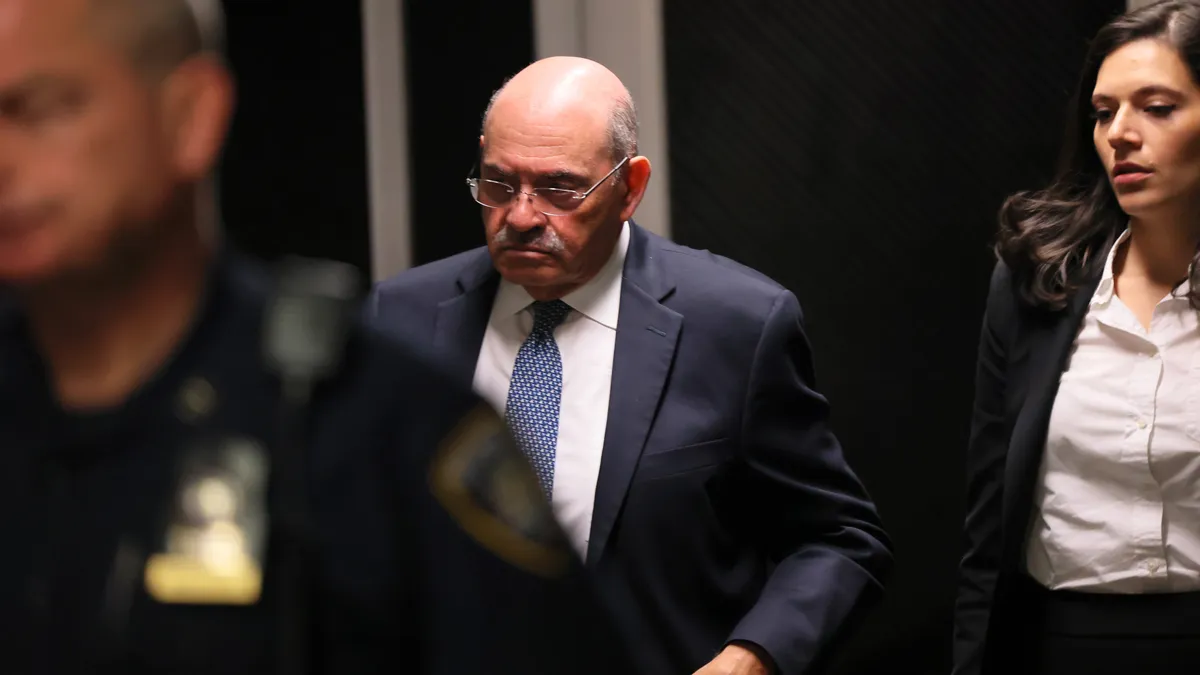Dive Brief:
- The jury that convicted two affiliates of the Trump Organization on 17 counts of tax fraud this week believed the company’s CFO, Allen Weisselberg, acted in behalf of the company even though he testified it was his own greed that led him to skirt New York tax laws.
- Weisselberg’s guilt wasn’t in question; he had pleaded guilty in August to taking some $1.7 million in perks, including the use of an apartment and a car, that wasn’t reported as income, lowering both his and the company’s tax obligations. Other executives received pay in unreported perks as well.
- The question before the jury in the case, presided over by Juan Merchan, an acting justice of the criminal branch of the New York State Supreme Court, was whether Weisselberg acted solely for his own benefit or to help the company by manipulating the books for two affiliates of the Trump Organization, the Trump Corporation and the Trump Payroll Corporation. In finding the company guilty on all 17 counts, the jury concluded Weisselberg’s actions were done in part to benefit the Trump Organization.
Dive Insight:
Defense attorneys during the trial argued that the prosecution needed to show that Weisselberg’s main intent in executing the tax scheme was to benefit the company, but Merchan, according to reports, knocked that argument down. The prosecution only needed to show Weisselberg had some intent to help the company.
During his testimony, Weisselberg admitted that both he and the company’s controller, Jeffrey McConney, knew reducing his income, and that of other executives, by the amount of unreported perks, would benefit the company by lowering its payroll tax obligation.
“He and McConney knew at the time that the company would pay less payroll taxes through the scheme although he said they never discussed it explicitly,” CNN reported Weisselberg testifying as part of his three days on the stand.
Defense attorneys argued the affiliates of the Trump Organization shouldn’t be implicated in a criminal scheme that Weisselberg orchestrated to benefit himself.
“Why would a corporation whose owner knew nothing about Weisselberg’s personal tax returns be criminally prosecuted for Allen Weisselberg’s personal conduct, for which they had no visibility or oversight?” said Susan Necheles of NechelesLaw.
But prosecutors said Weisselberg wasn’t a rogue actor; rather, company executives knew about and were fine with what he was doing.
“This whole narrative that Donald Trump [as head of the Trump Organization] is blissfully ignorant is just not true,” Joshua Steinglass, a Manhattan assistant district attorney, said, CNN reported.
The case reportedly turned on the semantics of the phrase “in behalf of,” because New York law requires the actions to be taken in behalf of the company if it’s to be liable for the crime.
The actions also have to be carried out by a high managerial agent and within the scope of the person’s employment, but those two criteria weren’t under question.
Merchan instructed the jury to understand “in behalf of” to mean “for the benefit of,” according to reports. That’s different from “on behalf of,” which implies an agency relationship.
“The prosecution and the defense spent weeks dissecting and debating the meaning of ‘in behalf of,’” the Seattle Times reported.
Even though the statute under which the prosecution was charging the company has been on the books for a long time, the Times report said, the meaning of “in behalf of” remains vague.
“To my knowledge, this really hasn’t been argued to the extent it’s being argued now,” Merchan said, according to the Times.
“The upshot of these abstruse reflections is that the defense attorneys believed that everything was riding on a single letter, an ‘i’ instead of an ‘o,’” said Philip Rotner, an attorney who commented on the case in a column. “Who says attorneys aren’t fun?”
Sentencing is slated for January. Defense attorneys have said they would appeal the verdict.











